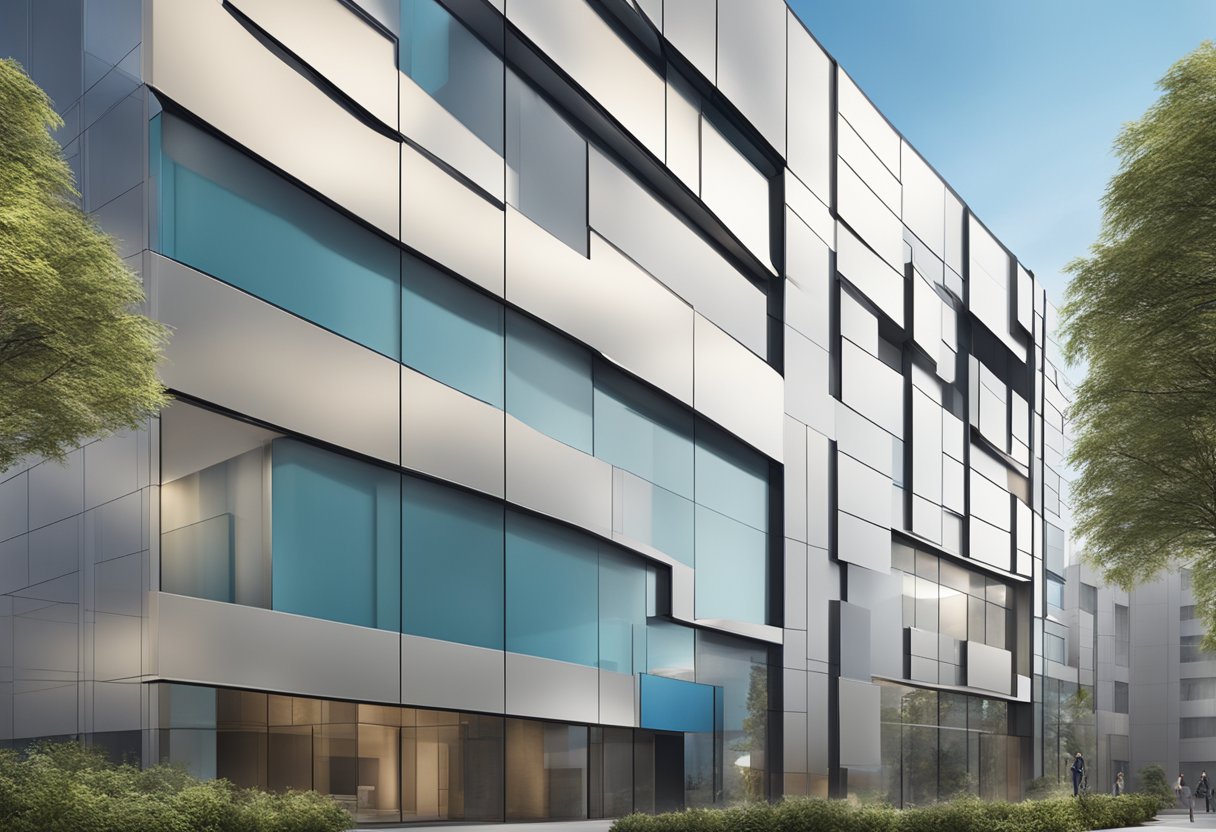Aluminum composite panels have become a popular choice for modern architecture and construction. These panels are made up of two layers of aluminum that sandwich a core material, typically made of polyethylene. The result is a lightweight, durable, and versatile material that can be used for a variety of applications.

If you are looking for aluminum composite panel suppliers near you, there are several factors to consider. First, you will want to find a supplier that offers a wide range of options in terms of colors, finishes, and sizes. You will also want to ensure that the supplier offers high-quality panels that meet industry standards and regulations. Finally, you will want to consider the supplier’s pricing and delivery options to ensure that you are getting the best value for your money.
Overview of Aluminum Composite Panels

Aluminum Composite Panels (ACPs) are a type of building material commonly used in modern architecture. They consist of two thin aluminum sheets bonded to a non-aluminum core, typically made of polyethylene. ACPs are known for their lightweight, durability, and versatility, making them a popular choice for both interior and exterior applications.
One of the key advantages of ACPs is their ability to be customized to meet specific design requirements. They are available in a wide range of colors, finishes, and textures, and can be cut and shaped to fit virtually any design. Additionally, ACPs are easy to install, reducing construction time and labor costs.
ACPs are commonly used in a variety of applications, including cladding, facades, signage, and interior design. They are also used in the construction of transportation vehicles, such as buses and trains, due to their lightweight and fire-resistant properties.
While ACPs offer numerous benefits, it is important to note that they have been subject to safety concerns in recent years. In 2017, the Grenfell Tower fire in London was attributed to the use of combustible ACPs in the building’s cladding. As a result, many countries have implemented stricter regulations on the use of ACPs in construction.
Overall, ACPs are a versatile and popular building material, but it is important to carefully consider their safety implications and adhere to regulations when using them in construction projects.
Benefits of Using Aluminum Composite Panels
Aluminum composite panels (ACPs) have become a popular choice for construction and renovation projects due to their numerous benefits. Here are some of the advantages of using ACPs.
Durability and Longevity
One of the primary benefits of ACPs is their durability and longevity. ACPs are made of two aluminum sheets that are bonded to a non-aluminum core, providing excellent strength and rigidity. This makes them resistant to impact, weathering, and corrosion, ensuring that they can withstand harsh environmental conditions and last for many years.
Aesthetic Appeal
ACPs are available in a wide range of colors, finishes, and textures, making them an ideal choice for architects and designers who want to create unique and visually appealing facades. They can be customized to match any design aesthetic, from sleek and modern to traditional and rustic, and can be used to create interesting patterns and shapes.
Maintenance and Cleaning
ACPs are easy to maintain and clean, requiring only occasional washing with soap and water to keep them looking new. They are also resistant to fading and discoloration, ensuring that they will maintain their appearance for years to come.
Overall, the benefits of ACPs make them an excellent choice for any construction or renovation project. Their durability, aesthetic appeal, and ease of maintenance make them a cost-effective and long-lasting solution for building facades, signage, and more.
Finding Aluminum Composite Panel Suppliers
When it comes to finding aluminum composite panel suppliers, there are two main options: local suppliers and online marketplaces. Each option has its own advantages and disadvantages, so it’s important to consider both before making a decision.
Local Suppliers
One of the benefits of working with a local supplier is the ability to see and touch the materials before making a purchase. This can be especially important if you’re looking for a specific color or texture. Additionally, local suppliers may be able to offer faster delivery times and lower shipping costs.
To find local suppliers, start by searching online directories or asking for recommendations from industry contacts. Once you have a list of potential suppliers, reach out to them to request samples and pricing information. Be sure to ask about minimum order quantities and lead times as well.
Online Marketplaces
Online marketplaces offer a wider selection of products and suppliers, making it easier to compare prices and find the best deal. They also offer the convenience of shopping from anywhere at any time.
When using an online marketplace, it’s important to do your research and read reviews before making a purchase. Look for reputable sellers with a track record of positive feedback. Additionally, be aware of shipping costs and delivery times, as these can vary greatly depending on the seller’s location.
Overall, whether you choose to work with a local supplier or an online marketplace, it’s important to do your due diligence and compare prices and options before making a purchase. With a little research, you can find the right aluminum composite panel supplier for your needs.
Installation and Fabrication Services
Professional Installation
When it comes to installing aluminum composite panels, it is highly recommended to seek the services of a professional. A professional installation ensures that the panels are installed correctly and safely, avoiding any potential damage or safety hazards. Professional installers have the necessary tools and expertise to ensure that the panels are installed to the highest standards. They can also provide valuable advice on maintenance and care of the panels.
DIY Installation Tips
For those who prefer to install aluminum composite panels themselves, there are some important tips to keep in mind. First, it is important to ensure that the surface where the panels will be installed is clean and free from any debris. This will help to ensure proper adhesion of the panels. It is also important to use the correct tools and equipment, such as a saw or router, to cut the panels to the correct size and shape.
Another important consideration is to ensure that the panels are installed with the correct spacing and overlap. This will help to ensure that the panels are properly secured and will not shift or move over time. It is also important to follow any manufacturer instructions or guidelines for installation, as they may vary depending on the specific type of panel being used.
Overall, while DIY installation of aluminum composite panels is possible, it is important to exercise caution and follow proper procedures to ensure a safe and effective installation.
Considerations for Choosing Panels
When selecting aluminum composite panels, there are several factors to consider. These factors include panel quality and standards, environmental impact, and cost factors.
Panel Quality and Standards
Panel quality is an important consideration when choosing an aluminum panel. Panels that meet industry standards and regulations are more likely to be reliable and perform well over time. Standards such as ASTM, AAMA, and ICC-ES provide guidelines for panel quality and performance.
In addition to industry standards, it is important to consider the manufacturer’s reputation and experience. Choosing a reputable manufacturer with a proven track record can help ensure that the panels meet quality standards and perform well over time.
Environmental Impact
Environmental impact is another important consideration when choosing aluminum composite panels. Panels that are made from sustainable materials and have a low carbon footprint are more environmentally friendly. Some manufacturers offer panels that are made from recycled materials or have a low VOC content, which can help reduce the environmental impact of the panels.
Cost Factors
Cost is also an important consideration when choosing aluminum composite panels. While it may be tempting to choose the least expensive option, it is important to consider the long-term costs of the panels. Cheaper panels may not meet industry standards or may have a shorter lifespan, which can result in higher maintenance and replacement costs over time.
It is important to balance cost considerations with panel quality and performance to ensure that the panels provide the best value over their lifespan.
Overall, choosing the right aluminum composite panel involves considering panel quality and standards, environmental impact, and cost factors. By weighing these factors carefully, it is possible to select panels that meet performance requirements while minimizing environmental impact and long-term costs.



